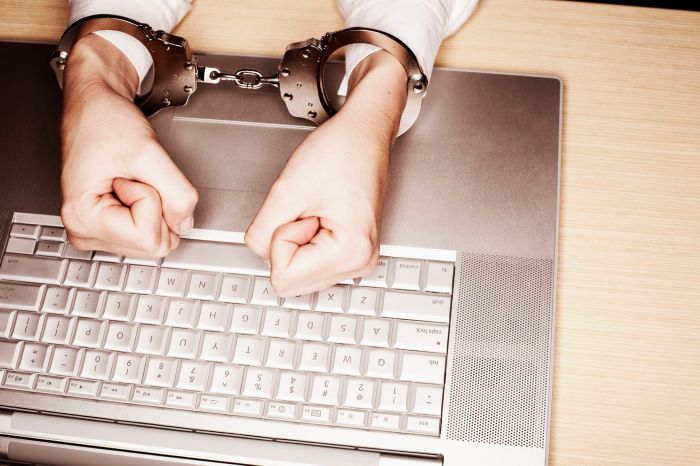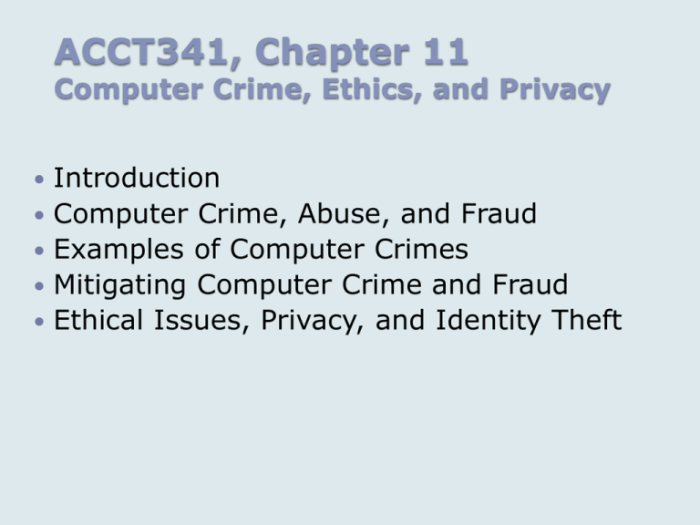Isps can investigate computer abuse committed by their customers – ISPs have a legal obligation to investigate computer abuse committed by their customers. This includes investigating network monitoring, packet sniffing, and log analysis. ISPs must balance their obligation to investigate abuse with the need to protect customer privacy. They can cooperate with law enforcement while protecting customer privacy.
ISPs must also take into account ethical considerations when investigating computer abuse.
ISPs’ Legal Obligations

ISPs have a legal obligation to investigate computer abuse committed by their customers. This obligation arises from a number of laws and regulations, including the Computer Fraud and Abuse Act (CFAA), the Electronic Communications Privacy Act (ECPA), and the USA PATRIOT Act.
The CFAA prohibits the unauthorized access, use, or damage of computers and computer networks. The ECPA prohibits the interception of electronic communications without the consent of the sender or recipient. The USA PATRIOT Act expands the government’s authority to investigate and prosecute computer crimes.
Methods of Investigation: Isps Can Investigate Computer Abuse Committed By Their Customers

ISPs can use a variety of methods to investigate computer abuse, including:
- Network monitoring: ISPs can monitor their networks for suspicious activity, such as unauthorized access attempts or Denial of Service (DoS) attacks.
- Packet sniffing: ISPs can use packet sniffing tools to capture and analyze network traffic. This can help them identify the source of attacks or other malicious activity.
- Log analysis: ISPs can analyze their logs to identify suspicious activity. Logs can include information such as the IP addresses of computers that have accessed the network, the time and date of access, and the type of activity that was performed.
Network Monitoring
Network monitoring is a powerful tool for detecting and preventing computer abuse. ISPs can use network monitoring tools to track all traffic on their networks, and to identify suspicious activity. For example, ISPs can use network monitoring to detect unauthorized access attempts, DoS attacks, and other malicious activity.
Packet Sniffing, Isps can investigate computer abuse committed by their customers
Packet sniffing is a technique that allows ISPs to capture and analyze network traffic. This can be useful for identifying the source of attacks or other malicious activity. However, packet sniffing can also be used to intercept private communications, so ISPs must use it carefully and in accordance with the law.
Log Analysis
Log analysis is another valuable tool for investigating computer abuse. ISPs can analyze their logs to identify suspicious activity. Logs can include information such as the IP addresses of computers that have accessed the network, the time and date of access, and the type of activity that was performed.
Common Queries
What are the legal obligations of ISPs in investigating computer abuse?
ISPs have a legal obligation to investigate computer abuse committed by their customers. This includes investigating network monitoring, packet sniffing, and log analysis. ISPs must balance their obligation to investigate abuse with the need to protect customer privacy.
What are the methods that ISPs can use to investigate computer abuse?
ISPs can use a variety of methods to investigate computer abuse, including network monitoring, packet sniffing, and log analysis. Each method has its own advantages and disadvantages.
What are the privacy concerns that arise when ISPs investigate computer abuse?
When ISPs investigate computer abuse, they must balance their obligation to investigate abuse with the need to protect customer privacy. ISPs can use a variety of methods to protect customer privacy, such as anonymizing data and using encryption.

